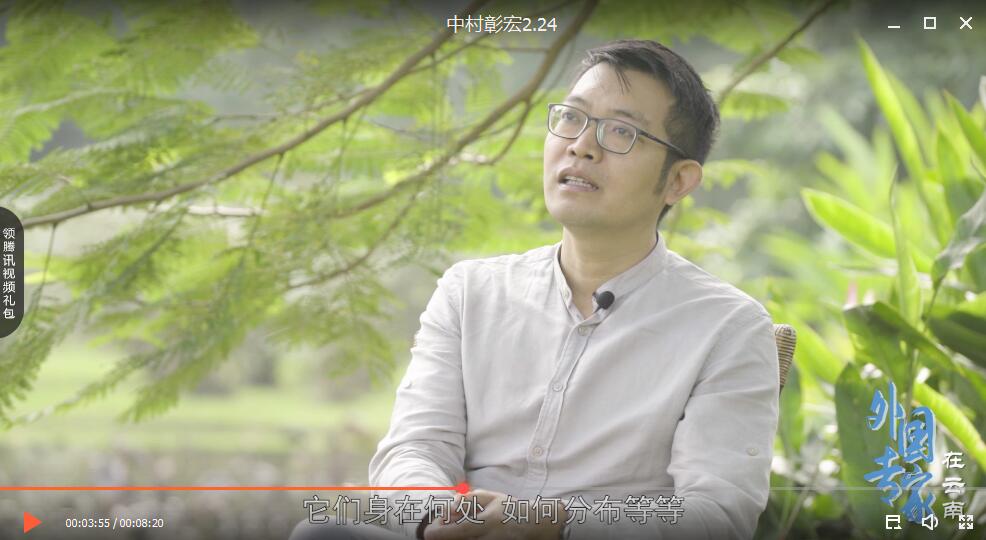Aki: My name is Akihiro, or Aki Nakamura, from Japan. I came to China in 2013, almost 9 years ago. I have been working here, in Xishuangbanna Tropical Botanical Garden, XTBG, ever since. At the moment, I’m working as a professor and a group leader of the Forest Canopy Ecology Lab. My life here has been great.
Why did you choose to come to Yunnan?
Aki: It’s a long story. I think, first, I would like to address that it is important to become someone unique, instead of being one of many. If you want to be successful in your career, being someone unique is very important. I was looking for a place to be like that and I found this place is ideal because the natural places and the working environment provide great research opportunities for people like biologists and ecologists like myself to work. And I enjoy working with Chinese colleagues.
In 2010, I was in Australia. I started working with colleagues from Xishuangbanna Tropical Botanical Garden. We started collaborating since 2010 for 3 years. During this collaborative project, I had a chance to visit China in 2010, I experienced life in China, I met a lot of people, I saw a lot of natural places. Then I thought China was nothing like what I was thinking before. This place gives unique opportunities for us to do tropical ecology like no other place. I made a lot of friends. At the end of the international project in 2013, my colleagues invited me to work in Xishuangbanna. I said yes and I didn’t even think twice. I just said yes.
After coming to Yunnan, what have you been mainly working on?
Aki: I’m an ecologist, but I mainly work on insects, basically, conservation and ecology of insects. I work on insect specimens collected from Yunnan. We collected insect samples in 2011 and turned them into specimens about 10 years ago. We just finished databasing these insects about 3 years ago. It took us 7 years to document the diversity of the insects we collected in 2011. It takes a lot of time to document the diversity of insects and to understand their ecology. We need to build basic knowledge of insect diversity because we know nothing about insects in this region and across the world. Ever since I came to China, I started working on the basic ecology of insects, mainly by documenting the biodiversity of insects. We want to know how many species of insects are in Yunnan Province? Where are they distributed? Also, I was very much interested in educating students from China and Southeast Asia. We have a lot of students from different countries. I was mentoring them to obtain master's degrees or Ph.D. My work has been recognized in Yunnan and the Yunnan Government gave me some recognition, one of them is the Yunnan Friendship Award, awarded for foreigners working in Yunnan. I’m very glad to have received it in 2019. I feel that I have achieved so little so far. I wish to stay here and I want to achieve more.
What does Xishuangbanna tropical rainforest contribute to your research?
Aki: You know this place, Xishuangbanna, is in the tropical area, a very unique area in China. It is great for people like us working on entomology, such as insect conservation and ecology. In addition, this place is located very close to Southeast Asia, which makes my research very convenient in many ways. I can work in Southeast Asia as well as China. A lot of research funding is available from the Chinese government, the Chinese Academy of Sciences, as well as the Yunnan government. They help us a lot to do research. Yunnan government supports us with ample resources. They recognize our contributions to science and conservation even though I am doing some basic science, not rocket science, not molecular biology, just basic science of documenting diversity. Xishuangbanna Tropical Botanical Garden, my work unit, also recognizes this kind of contribution like my work and they give us a lot of support. So, sincerely appreciate it. I don’t think I can do my work anywhere else other than China.
What is your plan in the future in China? Including your work and your personal life as well.
Aki: My wife is a Thai person. She feels comfortable here because the environment is similar to Thailand. She can even talk to local people here. They share a similar language. So this place is wonderful. If I use only one word to describe why I enjoy this place, it’s “diversity”. I love the cultural and natural diversity of this place. You know, as I said, insects are everywhere here; the diversity of insects is wonderful. Apart from insects, we even have elephants. When you move from Xishuangbanna to the north, to Kunming, Lijiang or Shangrila, you realize the diversity of animals and insects changes a lot. Also cultural diversity. We have a lot of different minorities. They have their unique cultural backgrounds. Their languages are different, cuisines are different. When you go to different places in Yunnan, you enjoy different cultures. So, what do I want to do in the future? A lot of things I’d like to do. But just pick up a few. I’d like to continue and expand our knowledge about insect diversity in Yunnan and address the conservation significance of this place. For my personal life, this place is getting more comfortable. You know the high-speed train has just been completed in Xishuangbanna and is open this month (December 2021). It is exciting for me because I can go back to Thailand by train and go visit Kunming easily. Our life is becoming more exciting, more convenient for us. Life is getting more comfortable here for us and there are a lot of work opportunities. So, why not here?

Aki Nakamura: Experts in Yunnan
(Credit: YNTV)

